(牛津译林版)必修二课件:Unit 2 Wish you were here grammar 将来进行时
文档属性
| 名称 | (牛津译林版)必修二课件:Unit 2 Wish you were here grammar 将来进行时 |  | |
| 格式 | zip | ||
| 文件大小 | 893.5KB | ||
| 资源类型 | 教案 | ||
| 版本资源 | 牛津译林版 | ||
| 科目 | 英语 | ||
| 更新时间 | 2016-01-30 17:56:05 | ||
图片预览

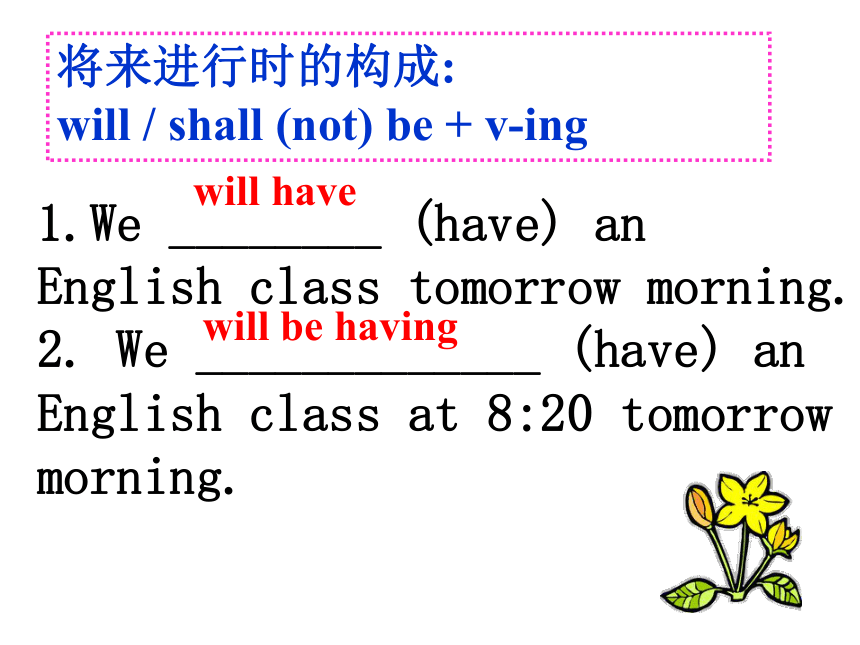
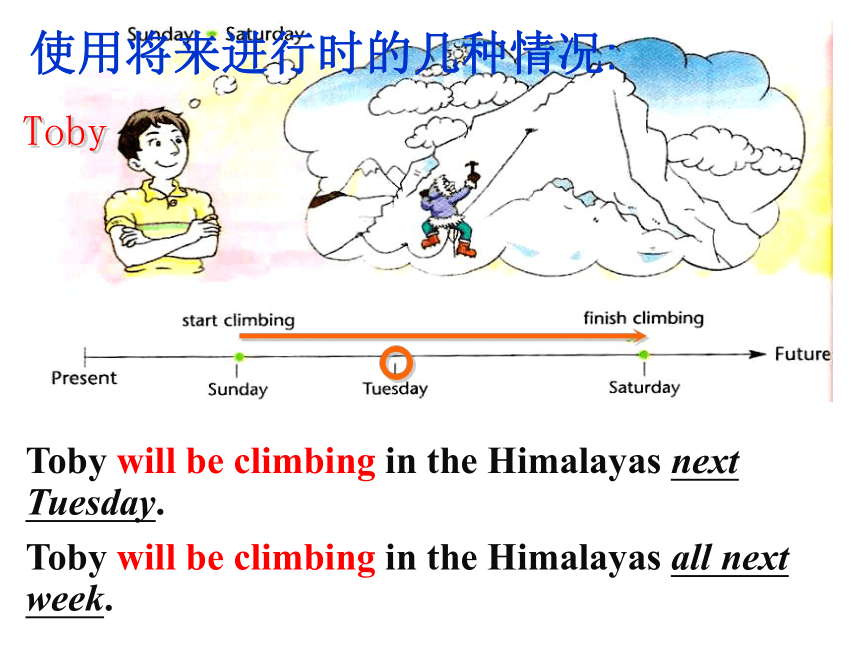
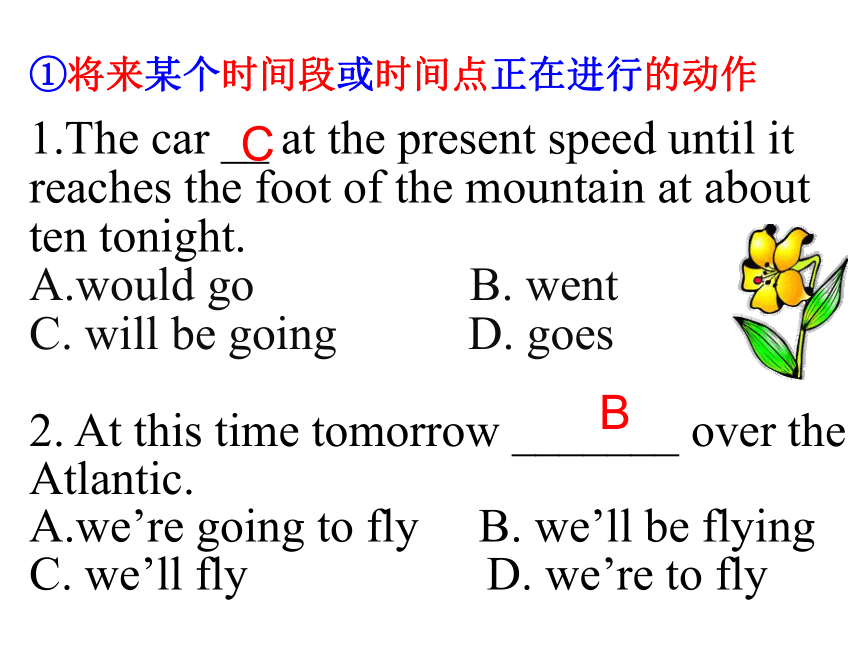
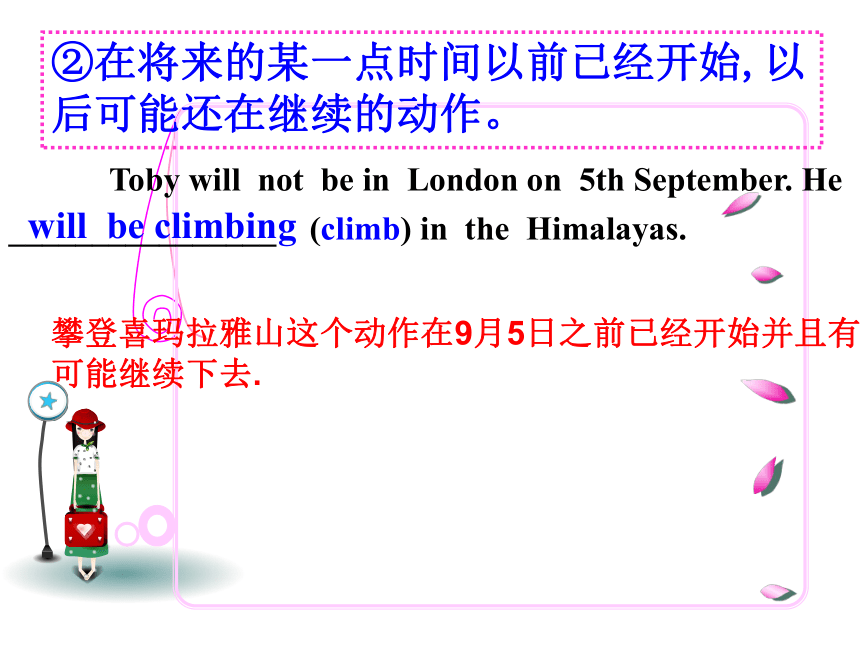
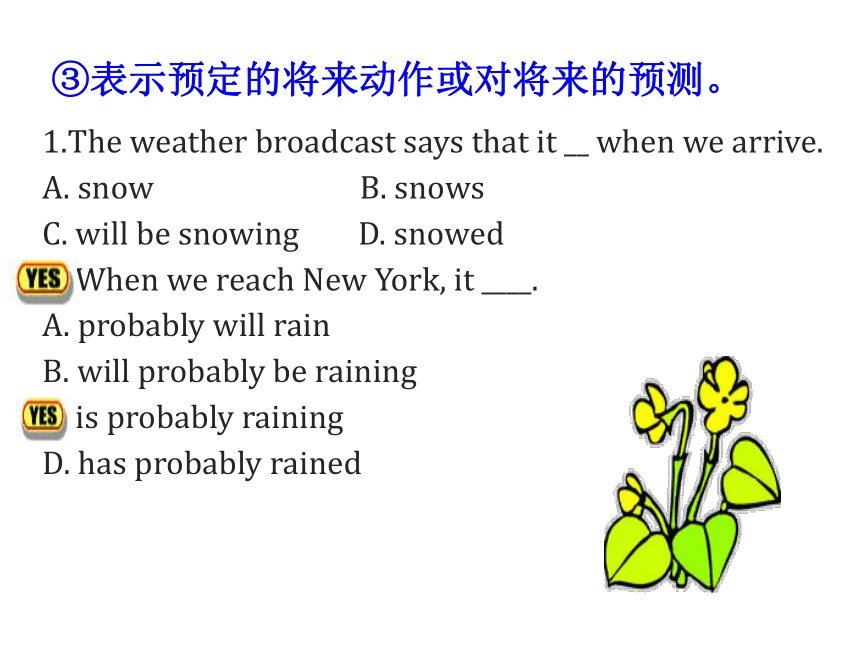
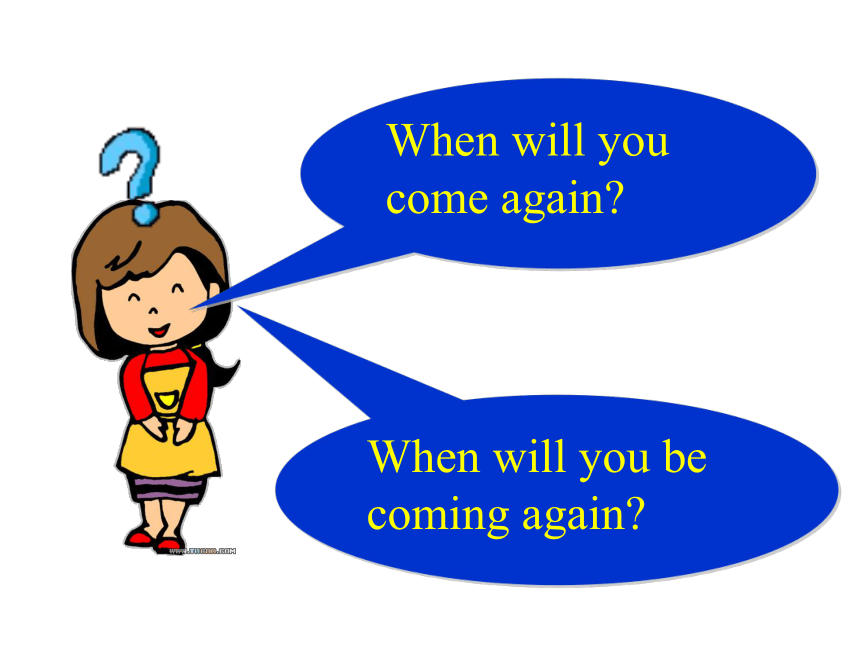
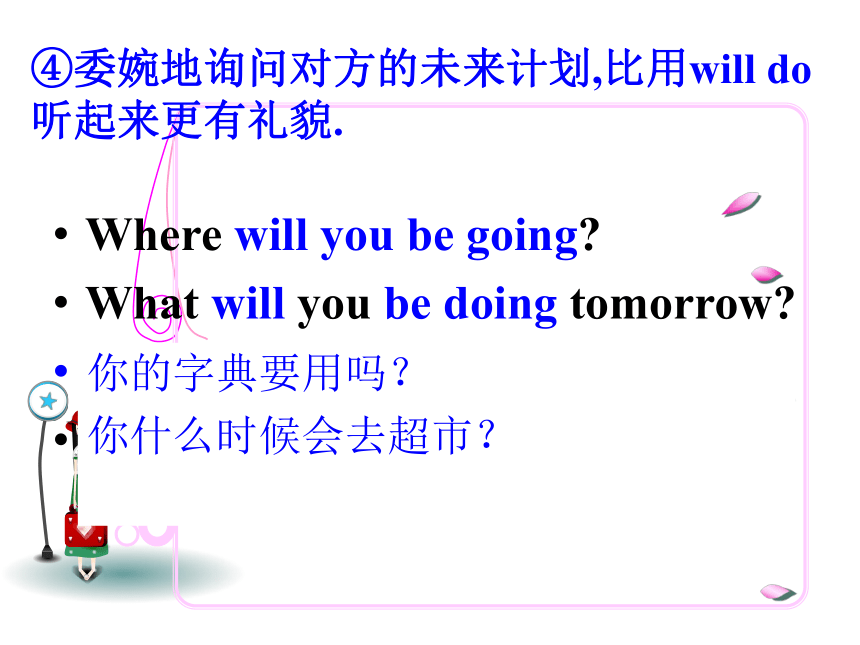
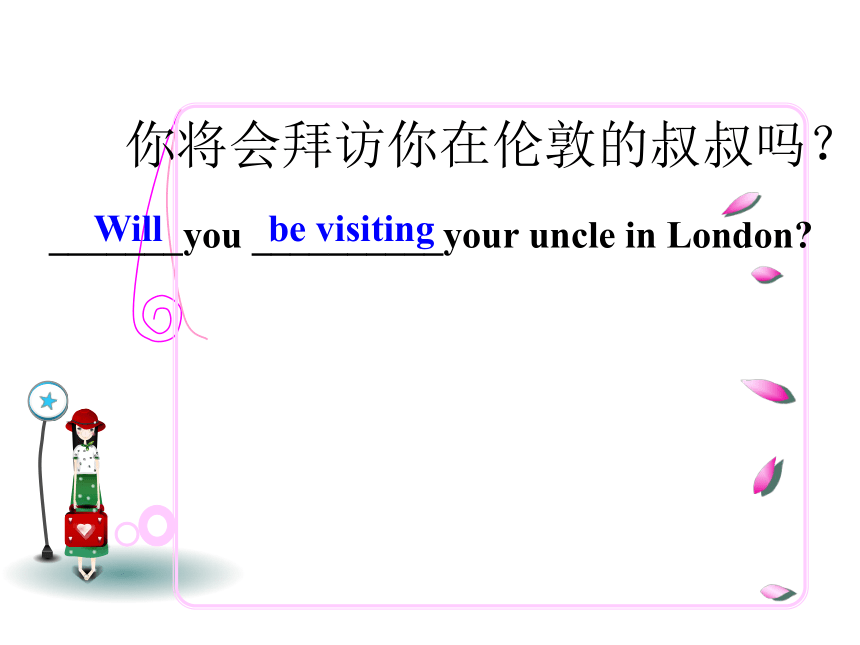
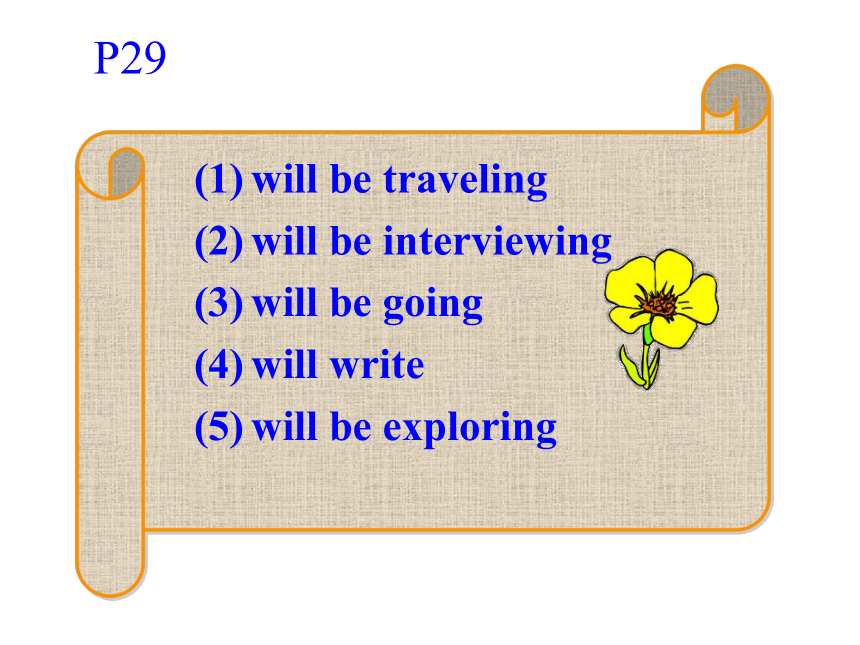

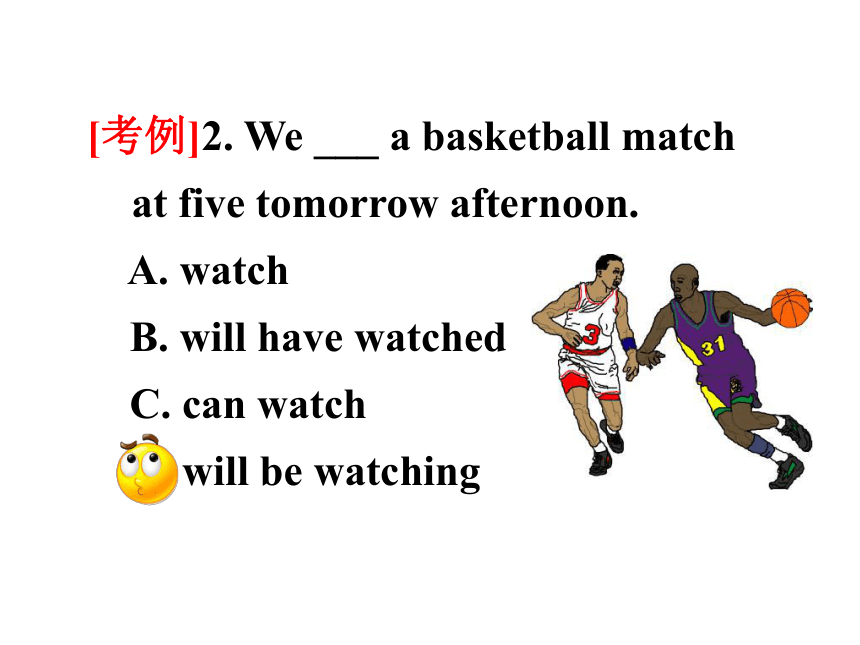
文档简介
课件42张PPT。 M2 U2 Grammar
将来进行时
Future continuous tense1.We ________ (have) an English class tomorrow morning.
2. We _____________ (have) an English class at 8:20 tomorrow morning. will be having will have将来进行时的构成:
will / shall (not) be + v-ingToby will be climbing in the Himalayas next Tuesday.
Toby will be climbing in the Himalayas all next week.
Toby使用将来进行时的几种情况:1.The car __ at the present speed until it reaches the foot of the mountain at about ten tonight.
would go B. went
C. will be going D. goes
2. At this time tomorrow _______ over the Atlantic.
A.we’re going to fly B. we’ll be flying
C. we’ll fly D. we’re to fly①将来某个时间段或时间点正在进行的动作
BC②在将来的某一点时间以前已经开始,以后可能还在继续的动作。 Toby will not be in London on 5th September. He ________________ (climb) in the Himalayas.
will be climbing攀登喜玛拉雅山这个动作在9月5日之前已经开始并且有可能继续下去.The weather broadcast says that it __ when we arrive.
A. snow B. snows
C. will be snowing D. snowed
2. When we reach New York, it ____.
probably will rain
B. will probably be raining
C. is probably raining
D. has probably rained③表示预定的将来动作或对将来的预测。
When will you come again?When will you be coming again?④委婉地询问对方的未来计划,比用will do听起来更有礼貌.Where will you be going?
What will you be doing tomorrow?
Will you be using your dictionary?
When will you be going to the supermarket?你的字典要用吗?你什么时候会去超市?
你将会拜访你在伦敦的叔叔吗?_______you __________your uncle in London?Will be visitingwill be traveling
will be interviewing
will be going
will write
will be exploringP29[考例]1. Henry will not be able to attend the meeting tonight because ____.
A. he must teach a class
B. he will be teaching a class
C. he teaches a class
D. he will have been teaching[考例]2. We ___ a basketball match at five tomorrow afternoon.
A. watch
B. will have watched
C. can watch
D. will be watching[考例]3. At this time tomorrow _____ over the Atlantic.
A. we’re going to fly B. we’ll be flying
C. we’ll fly D. we’re to fly[考例]4. If he ___, don’t interrupt him. A. still works B. will still be working C. still has been working D. is still working M2 U2 Grammar
过去将来时
Future in the past tensewould dowas/were going to dowas/were about to dowas/were doingwas/were to do过去将来时1.My mother will come to see me next week .
My mother said she ___________(come) to see me the next week .
2.They set off at 9 a.m. and___________ (reach) the airport an hour later.would comewould reachwould do:
表从过去某时间看将要发生的动作
或出现的状态1.They___________________(watch) the sunrise in the desert, but then there was a strong wind .
2.I __________________(leave), but then it began to rain.
3. Colin left work early because he____________ (see) Jennifer later that afternoon.
were going to watch were going to leavewere going to seewas/were going to do:
表过去曾经的打算或计划安排
准备要做的事。 1.She was busy packing ,because she ____________ (leave) for Shanghai.
was leavingwas/were doing:
表从过去某时间看马上要发生的动作。
表位移的动词:come, go, leave, arrive,
start等用 过去进行时表将来。1. The next day was 15 December , the day when I _____________(leave) for Nanjing.
2.It was his last day at school—he___________ (leave) the next morning.
was to leavewas to leave was/were to do:
表从过去某时看将来一定会发生的事。1. Hurry up . We are about to start .
Toby _________________ (start) when it began to rain .
2.Colin ________________(get) off the camel when a child ran towards him.
was about to startwas about to getwas/were about to do:
1. 与when构成固定搭配;
2. 不与时间状语连用。Tick the sentences which express future in the past.
1. Colin and I would be in Africa the next
Monday.
2. John was always going to the beach
when he was a kid.3. Jennifer was going to Hawaii
on holiday.
4. I was having dinner with some
friends when she called me.
5. Toby and Colin were to fly to
Morocco the next day.1. ---Alice, why didn’t you come yesterday? ---I___, but I had an unexpected visitor.
A. had B. would
C. was going to D. didMultiple choice2. I first met Lisa three years ago. She ____ at a radio shop at the time.
A. has worked B. was working
C. had just started D. had worked3. I don’t think Jim saw me; he____ into space.
A. just started B. was just starting
C. has just started D. had just started 4. We were all surprised when he made it clear that he_____ office soon.
A. leaves B. would leave
C. left D. had left5. ---Come in. I want to show you something.
---Oh, how nice of you! I___ you____ to
bring me a gift.
A. never think; are going
B. never thought; were going
C. didn’t think; were going
D. hadn’t thought; were going 6. As I ____ the next day, I went to bed early on Thursday evening. A. was leaving B. had left C. will leave D. left
7. I had no idea if he _____ the meeting. A. will attend B. attends C. will have attended D. would attend8. I ____ to start off when it began to rain. A. was B. was able C. wanted D. was about
9. They wanted to know what ____ next.
A. would happen B. has happened
C. will happen D. is going to happen知识扩充 would do 常有表示过去的时间状语, 多用于从句或间接引语中.2.was/ were going to往往也表示过去本打算或本认为会发生的动作或事态.(有时= was / were to do)My brother told me that he would be back on Saturday.--- where did you go for your weekend?
--- well, I was going to the theatre , but in the end I went to the cinema.4.was/ were to do通常指按过去的计划,安排将在某个过去将来时间发生的事态.有时可以与be going to do 互用
We were to have told you, but you were not in.(未曾实现的愿望)3.was/were doing 过去进行时可以表示过去将来,常用于(come/go/fly/leave等)I was leaving for Beijing tomorrow.1. My brother phoned me saying he ____ the following day.
A. will come B. was coming
C. comes D. had come
2. That night they had all their things packed, for they ______ leave the next day.
were to B. went to
C. going to D. should
3. I hoped that my teacher _____ me with my task.
A. will have helped B. would help
C. helped D. will help
Exercises1. We _____ leave when they came in .
A. are going to B. were to
C. are to D. were about to
2. I hoped that my teacher _____ me with my task.
A. will have helped B. would help
C. helped D. will help
3.In a room above the store, where a party _____, some workers were busy setting the table. A. was to be held B. has been held
C. will be held D. is being held
4. My brother phoned me saying he ____ the following day.
A. will come B. was coming
C. comes D. had come
5. That night they had all their things packed, for they ______ leave the next day.
A. were to B. went to
C. going to D. should
8. He____ anyone the minute he ____ they needed help.
A. would help; saw
B. helped; saw
C. will help; sees
D. helps; sees[考例]
—Tom, you didn’t come to the party last
night?
—I _____, but I suddenly remembered I
had homework to do. (2007全国卷II)
A. had to B. didn’t
C. was going to D. wouldn’tHomework1.Part B (P31)
2.C1&C2 (P96)Thank you!
将来进行时
Future continuous tense1.We ________ (have) an English class tomorrow morning.
2. We _____________ (have) an English class at 8:20 tomorrow morning. will be having will have将来进行时的构成:
will / shall (not) be + v-ingToby will be climbing in the Himalayas next Tuesday.
Toby will be climbing in the Himalayas all next week.
Toby使用将来进行时的几种情况:1.The car __ at the present speed until it reaches the foot of the mountain at about ten tonight.
would go B. went
C. will be going D. goes
2. At this time tomorrow _______ over the Atlantic.
A.we’re going to fly B. we’ll be flying
C. we’ll fly D. we’re to fly①将来某个时间段或时间点正在进行的动作
BC②在将来的某一点时间以前已经开始,以后可能还在继续的动作。 Toby will not be in London on 5th September. He ________________ (climb) in the Himalayas.
will be climbing攀登喜玛拉雅山这个动作在9月5日之前已经开始并且有可能继续下去.The weather broadcast says that it __ when we arrive.
A. snow B. snows
C. will be snowing D. snowed
2. When we reach New York, it ____.
probably will rain
B. will probably be raining
C. is probably raining
D. has probably rained③表示预定的将来动作或对将来的预测。
When will you come again?When will you be coming again?④委婉地询问对方的未来计划,比用will do听起来更有礼貌.Where will you be going?
What will you be doing tomorrow?
Will you be using your dictionary?
When will you be going to the supermarket?你的字典要用吗?你什么时候会去超市?
你将会拜访你在伦敦的叔叔吗?_______you __________your uncle in London?Will be visitingwill be traveling
will be interviewing
will be going
will write
will be exploringP29[考例]1. Henry will not be able to attend the meeting tonight because ____.
A. he must teach a class
B. he will be teaching a class
C. he teaches a class
D. he will have been teaching[考例]2. We ___ a basketball match at five tomorrow afternoon.
A. watch
B. will have watched
C. can watch
D. will be watching[考例]3. At this time tomorrow _____ over the Atlantic.
A. we’re going to fly B. we’ll be flying
C. we’ll fly D. we’re to fly[考例]4. If he ___, don’t interrupt him. A. still works B. will still be working C. still has been working D. is still working M2 U2 Grammar
过去将来时
Future in the past tensewould dowas/were going to dowas/were about to dowas/were doingwas/were to do过去将来时1.My mother will come to see me next week .
My mother said she ___________(come) to see me the next week .
2.They set off at 9 a.m. and___________ (reach) the airport an hour later.would comewould reachwould do:
表从过去某时间看将要发生的动作
或出现的状态1.They___________________(watch) the sunrise in the desert, but then there was a strong wind .
2.I __________________(leave), but then it began to rain.
3. Colin left work early because he____________ (see) Jennifer later that afternoon.
were going to watch were going to leavewere going to seewas/were going to do:
表过去曾经的打算或计划安排
准备要做的事。 1.She was busy packing ,because she ____________ (leave) for Shanghai.
was leavingwas/were doing:
表从过去某时间看马上要发生的动作。
表位移的动词:come, go, leave, arrive,
start等用 过去进行时表将来。1. The next day was 15 December , the day when I _____________(leave) for Nanjing.
2.It was his last day at school—he___________ (leave) the next morning.
was to leavewas to leave was/were to do:
表从过去某时看将来一定会发生的事。1. Hurry up . We are about to start .
Toby _________________ (start) when it began to rain .
2.Colin ________________(get) off the camel when a child ran towards him.
was about to startwas about to getwas/were about to do:
1. 与when构成固定搭配;
2. 不与时间状语连用。Tick the sentences which express future in the past.
1. Colin and I would be in Africa the next
Monday.
2. John was always going to the beach
when he was a kid.3. Jennifer was going to Hawaii
on holiday.
4. I was having dinner with some
friends when she called me.
5. Toby and Colin were to fly to
Morocco the next day.1. ---Alice, why didn’t you come yesterday? ---I___, but I had an unexpected visitor.
A. had B. would
C. was going to D. didMultiple choice2. I first met Lisa three years ago. She ____ at a radio shop at the time.
A. has worked B. was working
C. had just started D. had worked3. I don’t think Jim saw me; he____ into space.
A. just started B. was just starting
C. has just started D. had just started 4. We were all surprised when he made it clear that he_____ office soon.
A. leaves B. would leave
C. left D. had left5. ---Come in. I want to show you something.
---Oh, how nice of you! I___ you____ to
bring me a gift.
A. never think; are going
B. never thought; were going
C. didn’t think; were going
D. hadn’t thought; were going 6. As I ____ the next day, I went to bed early on Thursday evening. A. was leaving B. had left C. will leave D. left
7. I had no idea if he _____ the meeting. A. will attend B. attends C. will have attended D. would attend8. I ____ to start off when it began to rain. A. was B. was able C. wanted D. was about
9. They wanted to know what ____ next.
A. would happen B. has happened
C. will happen D. is going to happen知识扩充 would do 常有表示过去的时间状语, 多用于从句或间接引语中.2.was/ were going to往往也表示过去本打算或本认为会发生的动作或事态.(有时= was / were to do)My brother told me that he would be back on Saturday.--- where did you go for your weekend?
--- well, I was going to the theatre , but in the end I went to the cinema.4.was/ were to do通常指按过去的计划,安排将在某个过去将来时间发生的事态.有时可以与be going to do 互用
We were to have told you, but you were not in.(未曾实现的愿望)3.was/were doing 过去进行时可以表示过去将来,常用于(come/go/fly/leave等)I was leaving for Beijing tomorrow.1. My brother phoned me saying he ____ the following day.
A. will come B. was coming
C. comes D. had come
2. That night they had all their things packed, for they ______ leave the next day.
were to B. went to
C. going to D. should
3. I hoped that my teacher _____ me with my task.
A. will have helped B. would help
C. helped D. will help
Exercises1. We _____ leave when they came in .
A. are going to B. were to
C. are to D. were about to
2. I hoped that my teacher _____ me with my task.
A. will have helped B. would help
C. helped D. will help
3.In a room above the store, where a party _____, some workers were busy setting the table. A. was to be held B. has been held
C. will be held D. is being held
4. My brother phoned me saying he ____ the following day.
A. will come B. was coming
C. comes D. had come
5. That night they had all their things packed, for they ______ leave the next day.
A. were to B. went to
C. going to D. should
8. He____ anyone the minute he ____ they needed help.
A. would help; saw
B. helped; saw
C. will help; sees
D. helps; sees[考例]
—Tom, you didn’t come to the party last
night?
—I _____, but I suddenly remembered I
had homework to do. (2007全国卷II)
A. had to B. didn’t
C. was going to D. wouldn’tHomework1.Part B (P31)
2.C1&C2 (P96)Thank you!
